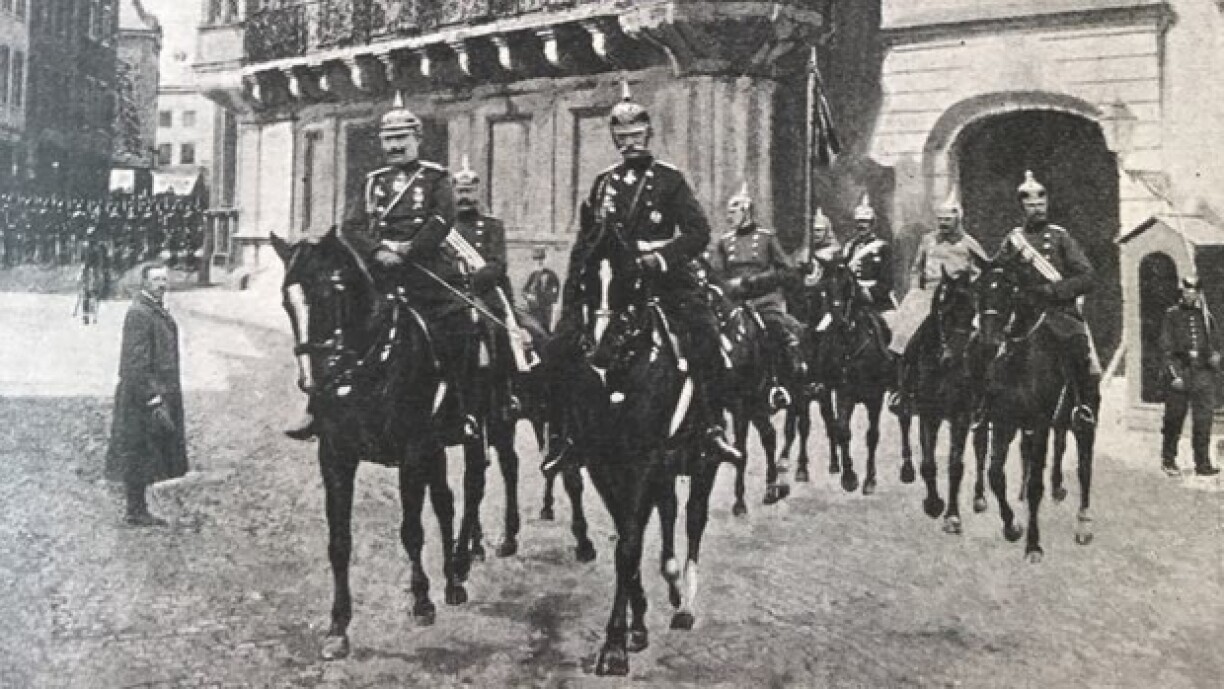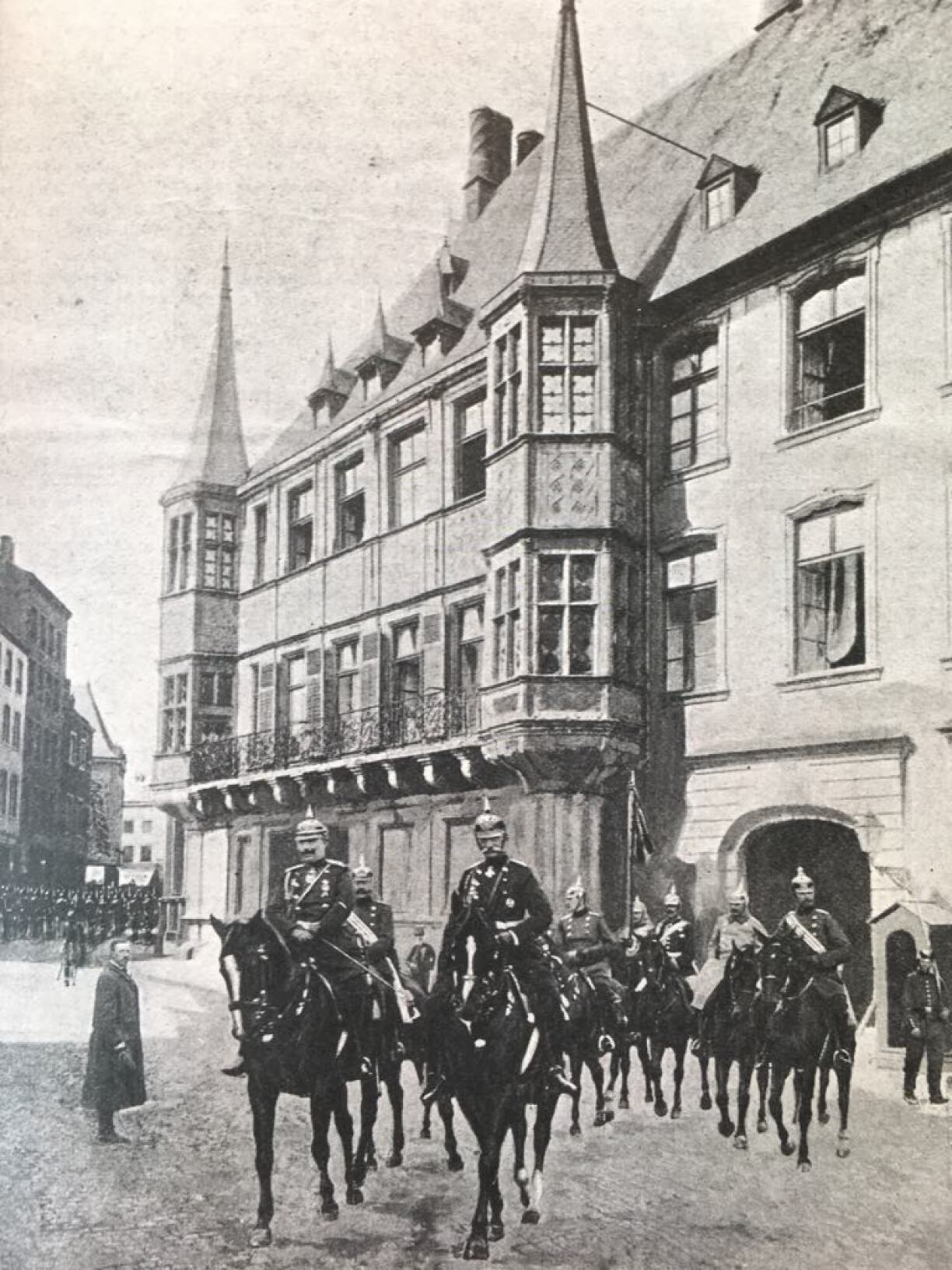
Life back in Luxembourg was not much easier. The Grand Duchy was under German occupation for the entirety of World War I, and the population did not exactly welcome the Germans with open arms, as shown by a fascinating story that involved the German Kaiser Wilhelm.
Listen to the podcast episode right here – including learning about Germany’s accidental invasion of Luxembourg and the brave men fighting with the allies – or continue reading just below.
During the initial offensive of the Schlieffen Plan, as German troops raced towards Paris in August 1914, Kaiser Wilhelm’s military headquarters were set up in Luxembourg. Michel Welter, a contemporary politician and diarist, recalled that when the Kaiser arrived in the capital, he was met with a frosty reception from both ordinary citizens and the political elite. Things did not get any better for the Kaiser.
A New York Times article from February 1916 recounted a ‘Thrilling Incident of the War that has Passed Unnoticed.’ After a month in Luxembourg, and with German troops retreating from the Marne in France, Wilhelm decided to leave a city where no citizen ever saluted him in the street.
As his motorcade left the capital, it suddenly came under fire from some unknown ‘francs-tireurs’, who had apparently ‘known that the Kaiser was coming and had prepared an ambuscade for him,’ killing and wounding a number of German troops but leaving Wilhelm unharmed.
The New York Times article concluded that if only the bullet had found its mark, the whole history of the war might have been different. Although there is no evidence to suggest this dramatic episode ever occurred, the emergence of this story shows the extent to which the Luxembourgish people were opposed to the German occupation.
Outright resistance was extremely difficult. Officially a neutral country under German occupation, Luxembourg retained its own government and laws. Luxembourgers who left the country for a short period escaped the brutal treatment meted out to resisting Belgians and French, but any action opposing the German army would result in severe punishment.
With this in mind, Prime Minister Paul Eichen asked the population not to participate in acts of espionage or direct opposition against the occupiers. Nevertheless, some Luxembourgers found ways to show their hostility through clandestine resistance. One example was Camille Joset, a provincial councillor, journalist, and newspaper editor, who set up an organization to help retreating French soldiers hiding in the woods of border areas.
Joset devised a system to disguise the soldiers as Luxembourgish residents before exfiltrating them to France through Switzerland. His organization helped evacuate an estimated 207 French soldiers before he was arrested in April 1915 and handed a death sentence, which was ultimately commuted.
The British and French secret services also recruited Luxembourgers to report on German troop movements using the Luxembourgish railway network. At least three separate observation rings were set up, including one known as the Dames Blanches, and one by Lise Richard, who sent coded messages to her handlers in Paris through an agricultural journal in Diekirch called Der Landwirt.
Richard’s achievements were recently covered in Janet Morgan’s book The Secrets of Rue St Roch. For her and her colleagues, this was a great opportunity. She received the honor of Commander of the British Empire, while a dozen or so others were granted the Order of the British Empire. However, Luxembourg’s distance from Allied lines and lack of communication made organized resistance difficult, and these isolated events remain little known today.
The most difficult part of the German occupation for ordinary Luxembourgers was the constant shortage of food. Initially well-provisioned and expecting the conflict to end quickly, Luxembourg offered food to neighbors in occupied France and Belgium.
As the war dragged on, however, stocks were depleted and by the summer of 1915, the cost of bread and potatoes had doubled, with beans, peas and lentils tripling in price. By 1916, malnutrition had become a serious problem, and shortages were exacerbated by the 5,000 or so German troops who were stationed in Luxembourg.
Government efforts to secure food from neutral countries such as the Netherlands or Swizterland were largely unsuccessful, and at the end of 1916 the population was at risk of starvation. The only solution was to turn to the Germans. In November 1916, the Luxembourgish government signed secret accords which left the provision of food to Luxembourg under German control, a decision which rendered the Grand Duchy a hostage to the occupiers.
Although few actually starved to death, malnutrition led to increased mortality rates as the population became vulnerable to tuberculosis and the flu. The reality of World War I for most Luxembourgers was a daily struggle against hunger and malnutrition, and the discontent caused by the German occupation would eventually lead to the abdication crisis of 1918–1919.
Thank you for tuning in! Now what are you waiting for – download and listen, on iTunes, Spotify, or wherever you get your podcasts.
